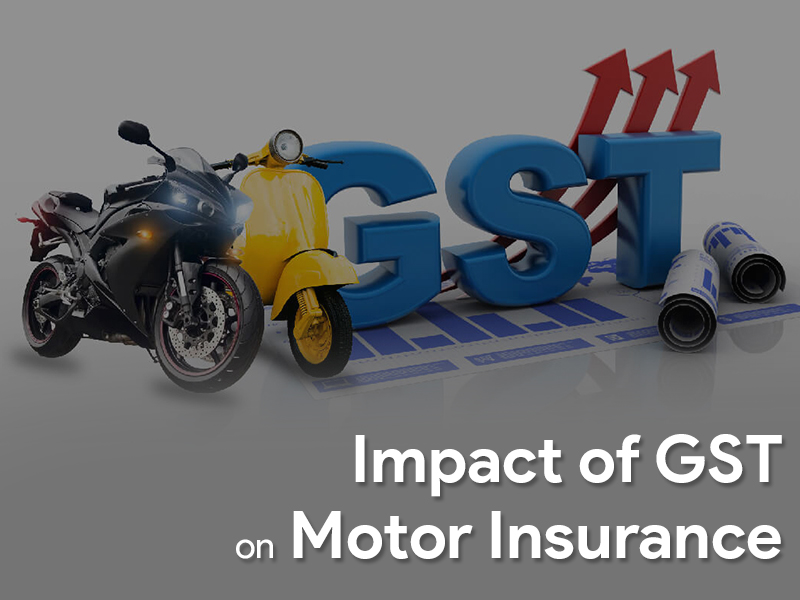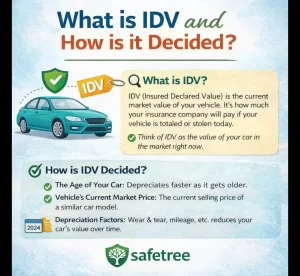
GST – Impact on Motor Insurance
You live in an apartment. The apartment is a part of a gated community called Society. Society needs to complete some basic tasks for every apartment, such as cleaning up the common areas, collecting garbage from each household and the common area, maintaining lights and lifts, and maintaining the building, among other activities. Who should take the responsibility to do all these things? Why should that single individual or group of individuals take that responsibility? How would such people fulfill those responsibilities?
Let us answer these questions one by one.
-
Who should take the responsibility?
Well! The people who are living in that society should be responsible.
2. Can every single individual be involved in such an activity?
No! Involvement of such a huge number of people would create chaos, and work would be hampered. It is why a group of people is selected to be the esteemed member of the Resident Welfare Association of society.
3. Who selects the members?
The entire resident population of the society chooses this association or team of people based on the members’ credentials, experience, and capabilities.
4. Why should the group of individuals take the additional responsibility of maintaining the society?
They should take responsibility because they are selected members of the association. They have been assigned to maintain society as the representative body of the people staying in society.
5. How would such people fulfil their responsibilities?
This team of people would appoint personnel to take care of every single activity. Certainly, they are not in a position to perform each task themselves. Therefore, they need to hire professional experts to carry out such work. While they hire professionals, they need to pay them.
6. What will be the source of funds used to pay such hired professionals?
Well! Since these are common society tasks, society needs to create a contributory fund to pay such professionals. Every single flat in society should contribute to this contributory fund to ensure society’s smooth functioning and well-being.
We are thinking of why this lengthy discussion on society and their resident welfare association? Well! Isn’t the situation somewhat similar to the country we live in? Imagine our country as a big residential society and our government to be the Resident Welfare Association. The government is the selected and elected body that performs tasks required for the well-being of the citizens (such as the creation of necessary infrastructure and providing basic amenities to the citizens). The government creates a contributory fund called TAX to perform these well-being tasks on behalf of this country’s citizens. Tax is, therefore, a contribution made by the citizens to facilitate the tasks of well-being. The government is cautious in collecting TAX from only those who can pay such TAX and uses the amount received for all the citizens (including those who do not pay taxes). It is validated by the comment of James Madison, the fourth President of the USA – “The power of taxing people and their property is essential to the very existence of government.”
The Indian Taxation System
The Indian taxation system can be classified under the following two broad headings:
- Direct Taxes
- Indirect Taxes
Direct taxes are easy to understand and collect. Direct taxes indicate that people are directly taxed for their income, assets, and properties. Why should they be taxed for their income? Well! People use national property such as roads, electricity, and water, among other infrastructure, to earn their income. Therefore, they should pay such taxes to facilitate the maintenance of these infrastructures. Income Tax and property tax are examples of direct taxes paid by individual residents or households.
Indirect taxes are taxes claimed by the government upon the facilities, goods, and services that the citizens use regularly. Why should people pay indirect taxes? Well! Citizens need to pay such taxes because the creation and transportation of such facilities, goods, and services use public infrastructure. Several indirect taxes were collected by the government until recently, such as the Central Sales Tax, the Central Excise Duty, and many others. At times, the indirect taxes were taxed (since there was a differentiation of taxes collected at the central and state levels). The entire indirect taxation regime was reformed by introducing a common taxation scheme called the Goods and Services Tax (GST).
What is GST?
GST, or Goods and Services Tax, is a comprehensive taxation system covering indirect taxation of the manufacture, sale, and consumption of all goods and services. With the implementation of GST, indirect taxation has become easy to understand, comprehend, and collect from the citizens on a national level (because fixed-rate slabs (0%, 5%, 12%, and 18%) of GST have been defined for all the goods and services depending on the nature of the goods and services and their utility among citizens). GST has replaced all other indirect taxes, especially taxes levied on goods and services by both the Central and State Governments. GST is further classified under the following three heads:
- CGST: GST collected by the Centre
- SGST: GST collected by the state
- IGST: Interstate Goods and Services Transaction Tax
Since July 1, 2017, GST has been implemented on the manufacture, sale, and consumption of all goods and services within India’s territory. Insurance is an essential service availed by Indian citizens. Classified as a service, insurance also falls under the ambit of GST. Thus, all insurance types, including insurance of motor vehicles, attract indirect taxation under the GST. Therefore, customers purchasing insurance from insurance companies require paying the indirect tax called GST that is usually collected as a percentage of the premium paid.
Impact of GST on Motor Insurance
Before implementing GST, Motor Insurance was subjected to service tax, as insurance is a service provided for the benefit of India’s citizens. Implementation of GST has abolished the service tax system. Since insurance, including motor insurance, is a kind of premium service availed by the privileged citizens of India (motor insurance is availed by privileged citizens owning vehicles), the GST rate that is levied on insurance purchasers falls under the higher GST tax rate of 18%. Incidentally, this is around 3% higher than the rate of service tax (motor vehicle insurance charged 15% service tax) that was levied upon the individual insurance purchasers. Therefore, GST’s implementation has made motor insurance a little expensive compared to the pre-GST era. The 18% GST is charged on the individuals’ premium towards insuring their motor vehicles (includes both four-wheelers and two-wheelers) and on any rider premiums paid for availing any insurance rider by the individuals.
We will contact you as soon as possible, please fill in your details!



Share this post:
Facebook Twitter LinkedIn WhatsApp